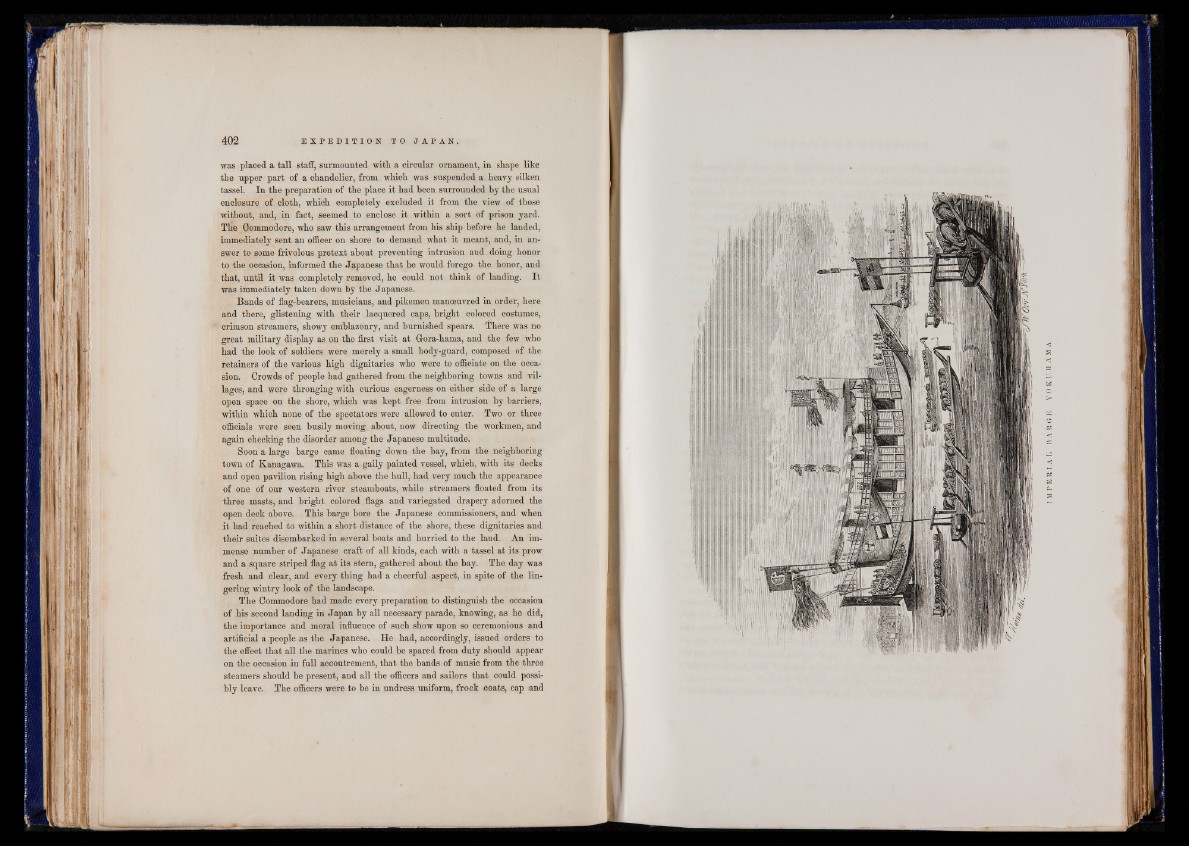
was placed a tall staff, surmounted with a circular ornament, in shape like
the upper part of a chandelier, from which was suspended a heavy silken
tassel. In the preparation of the place it had been surrounded by the usual
enclosure of cloth, which completely excluded it from the view of those
without, and, in fact, seemed to enclose it within a sort of prison yard.
The Oommodore, who saw this arrangement from his ship before he landed,
immediately sent an officer on shore to demand what it meant, and, in answer
to some frivolous pretext about preventing intrusion and doing honor
to the occasion, informed the Japanese that he would forego the honor, and
that, until it was completely removed, he could not think of landing. It
was immediately taken down by the Japanese.
Bands of flag-bearers, musicians, and pikemen manoeuvred in order, here
and there, glistening with their lacquered caps, bright colored costumes,
crimson streamers, showy emblazonry, and burnished spears. There was no
great military display as on the first visit at G-ora-hama, and the few who
had the look of soldiers were merely a small body-guard, composed of the
retainers of the various high dignitaries who were to officiate on the occasion.
Crowds of people had gathered from the neighboring towns and villages,
and were thronging with curious eagerness on either side of a large
open space on the shore, which was kept free from intrusion by barriers,
within which none of the spectators were allowed to enter. Two or three
officials were seen busily moving about, now directing the workmen, and
again checking the disorder among the Japanese multitude.
Soon a large barge came floating down the bay, from the neighboring
town of Kanagawa. This was a gaily painted vessel, which, with its decks
and open pavilion rising high above the hull, had very much the appearance
of one of our western river steamboats, while streamers floated from its
three masts, and bright colored flags and variegated drapery adorned the
open deck above. This barge bore the Japanese commissioners, and when
it had reached to within a short distance of the shore, these dignitaries and
their suites disembarked in several boats and hurried to the land. An immense
number of Japanese craft of all kinds, each with a tassel at its prow
and a square striped flag at its stem, gathered about the bay. The day was
fresh and clear, and every thing had a cheerful aspect, in spite of the lingering
wintry look of the landscape.
The Commodore had made every preparation to distinguish the occasion
of his second landing in Japan by all necessary parade, knowing, as he did,
the importance and moral influence of such show upon so ceremonious and
artificial a people as the Japanese. He had, accordingly, issued orders to
the effect that all the marines who could be spared from duty should appear
on the occasion in full accoutrement, that the bands, of music from the three
steamers should be present, and all the officers and sailors that could possibly
leave. The officers were to be in undress uniform, frock coats, cap and